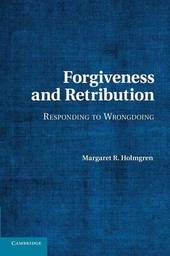
|
Forgiveness and Retribution: Responding to Wrongdoing
Paperback / softback
Main Details
| Title |
Forgiveness and Retribution: Responding to Wrongdoing
|
| Authors and Contributors |
By (author) Margaret R. Holmgren
|
| Physical Properties |
| Format:Paperback / softback | | Pages:310 | | Dimensions(mm): Height 229,Width 152 |
|
| Category/Genre | Ethics and moral philosophy
Social and political philosophy |
|---|
| ISBN/Barcode |
9781107695658
|
| Classifications | Dewey:177 |
|---|
| Audience | | Professional & Vocational | | Tertiary Education (US: College) | |
|---|
|
Publishing Details |
| Publisher |
Cambridge University Press
|
| Imprint |
Cambridge University Press
|
| Publication Date |
20 February 2014 |
| Publication Country |
United Kingdom
|
Description
Forgiveness and Retribution: Responding to Wrongdoing argues that ultimately, forgiveness is always the appropriate response to wrongdoing. In recent decades, many philosophers have claimed that unless certain conditions are met, we should resent those who have wronged us personally and that criminal offenders deserve to be punished. Conversely, Margaret Holmgren posits that we should forgive those who have ill-treated us, but only after working through a process of addressing the wrong. Holmgren then reflects on the kinds of laws and social practices a properly forgiving society would adopt.
Author Biography
Margaret Holmgren is Associate Professor of Philosophy at Iowa State University. She co-edited Ethical Theory: A Concise Anthology (2000) with Heimir Giersson.
Reviews'Margaret Holmgren's book is a daring attempt to defend a new paradigm of forgiveness that would radically reorient our attitudes toward those who wrong us and our way of thinking about punishment and criminal law. No doubt the discussion it provokes will be intense.' George W. Harris, author of Reason's Grief: An Essay on Tragedy and Value 'Moral, political, and legal philosophers who prize theoretical unity and comprehensiveness will appreciate Margaret Holmgren's new book, which begins with a foundational virtue ethic and from it systematically derives conclusions about how individuals and institutions should respond to wrongdoers. Holmgren's work is probably the most thoughtful and thorough defense of an unconditional forgiveness approach to wrongdoers, one that critically responds to work by contemporary retributivists and that should give them pause. Of particular interest is the fact that Holmgren argues that principles such as respect for offenders and for victims, to which retributivists standardly appeal, are best interpreted in ways that support anti-retributivist conclusions, such as the restitutional approach to punishment for which Holmgren is rightly well-known.' Thaddeus Metz, Humanities Research Professor, University of Johannesburg 'Margaret Holmgren has written a very stimulating book on forgiveness ... An additional virtue of her book is a discussion of forgiveness in the context of criminal punishment - a discussion in which she makes creative suggestions concerning the social and legal institutions that a truly forgiving society would adopt. I recommend that all those interested in a serious discussion of forgiveness read this book and ponder its many insights.' Jeffrie G. Murphy, Arizona State University and author of Getting Even: Forgiveness and Its Limits '... forces us to think harder about predominantly retributivist and all-too-settled models of response to harm ... It is a book for exercising one's arguments, a service to philosophy.' Philosophy in Review
|